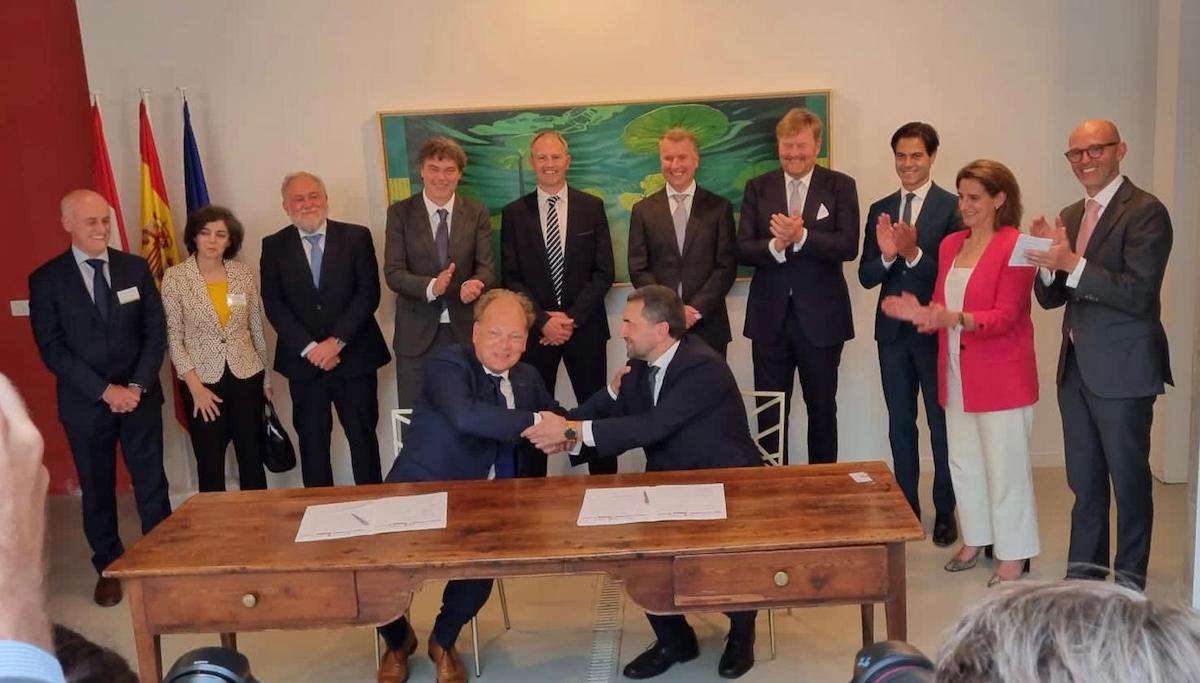The ports of Bilbao and Amsterdam, the Basque Energy Agency (EVE), Petronor and the Dutch organisations SkyNRG, Evos Amsterdam and Zenith Energy Terminals will together drive the creation of this European Corridor.
The European Corridor between the ports of Bilbao and Amsterdam will connect the hydrogen valleys of the Basque Hydrogen Corridor (BH2C) and the Noord-Holland Hydrogen Hub.
The ports of Bilbao and Amsterdam, the Basque Energy Agency (EVE), Petronor and the Dutch organisations SkyNRG, Evos Amsterdam y Zenith Energy Terminals have today signed an agreement to develop a European Green Hydrogen Corridor between the ports of Bilbao and Amsterdam by establishing a maritime route between the two cities.
The agreement was signed by Carlos Alzaga, Managing Director of the Port Authority of Bilbao; Iñigo Ansola, General Manager of the Basque Energy Agency (EVE); José Ignacio Zudaire, Deputy CEO at Petronor, Gert-Jan Nieuwenhuizen, Managing Director of the International Port of Amsterdam; Theye Veen, CCO of SkyNRG; Ramon Ernst, Managing Director at Evos; and Tadhg Deasy, Managing Director at Zenith Energy Europe. HM King Willem-Alexander of the Netherlands, and the Vice-President of the Spanish Government, Teresa Ribera, oversaw the signing ceremony.
The partners will work together to develop a supply chain for renewable hydrogen and synthetic fuels, focusing on production in the Basque Country and export to the Netherlands and the European hinterland through the port of Amsterdam.
The Port of Bilbao is part of the Basque Hydrogen Corridor, a collaborative initiative spearheaded by Petronor and EVE to decarbonise the energy, industrial, residential and mobility sectors.
This initiative ties in with both the Basque Hydrogen Strategy being taken forward by EVE, aimed at both local usage and international markets, and with the Dutch government’s promotion of the production, import and use of green hydrogen.
Setting up a corridor between Bilbao and Amsterdam will connect two growing hydrogen valleys. The corridor will not only enable the trade of green hydrogen and synthetic fuels, but will also foster the exchange of knowledge and expertise between the parties involved. Both parties will jointly discuss the next steps for their collaboration, which will ultimately further strengthen the Dutch-Spanish relationship and contribute to the overall goal of reducing emissions.
Decarbonisation projects using green hydrogen
Petronor, together with several other companies and with the support of EVE, is taking forward a series of projects in the Basque Country, including the construction of electrolysers to produce green hydrogen and a demonstration plant for the production of hydrogen-based e-fuels, using CO2 and green hydrogen as feedstock.
The Port of Bilbao will serve as a hub for the export of green hydrogen and its derivatives. As a key logistical centre in Europe, the role of the Port of Bilbao can be leveraged to become a key provider of green hydrogen to, in particular, North-West Europe. Setting up a European green hydrogen corridor between the ports of Bilbao and Amsterdam will support this challenge.

The Port of Amsterdam operates Europe’s fourth largest port and is firmly committed to developing green hydrogen facilities within its port area, as well as to establishing import corridors for green hydrogen and its derivatives. One of the most prominent sectors supplied by the Port of Amsterdam is the aviation industry. The port features a direct connection to one of Europe’s largest airports, Amsterdam Airport Schiphol.
Jose Ignacio Zudaire, Deputy CEO at Petronor and President of the Basque Hydrogen Corridor, highlighted that “the project being promoted and rolled out by the Basque Hydrogen Corridor across the whole hydrogen value chain is of critical importance for the Basque Country”, adding that the project is underpinned by the existence of a highly favourable ecosystem capable of leading this challenge of establishing green hydrogen as an energy carrier. “Geographically, the Basque Country offers several strategic benefits, such as an industrial port, a gas network and infrastructure, driver companies and a consolidated industrial fabric”.
Iñigo Ansola, General Manager of EVE, described the agreement reached with Amsterdam as “an important step in the development of the new Hydrogen Economy”, and that hydrogen as an energy industry “is key to the future of the Basque Country and Europe. The development of a European and global hydrogen market is on the horizon”.
Carlos Alzaga, Managing Director of the Port Authority of Bilbao, commented that “the Port of Bilbao is fully committed to the production, transport and use of renewable energy, and supports and works together with those companies which are developing green sources of energy. Green hydrogen provides one of the most important paths towards that goal”. Thanks to public-private collaboration in the Basque Country around this new technology, with initiatives such as the Basque Hydrogen Corridor – BH2C, Bilbao has become an energy hub for the production and distribution of this energy carrier. Among the projects that will soon see the light of day, Alzaga highlighted the synfuel production plant to be powered by green hydrogen produced by Petronor itself, part of the Repsol Group. The plant will be built within the premises of the Port of Bilbao. “This is an innovative and strategic project which will, without doubt, play a significant part in developing the hydrogen economy in our hinterland and throughout Europe”.

 Port access
Port access